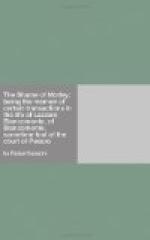Next I made him tell me what he knew of Filippo di Santafior and Madonna Paola. On this subject he was better informed. Madonna Paola was well and still lived with her brother at the Palace of Pesaro. The Lord Filippo was high in favour with the Borgias, and Cesare lately had been frequently his guest at Pesaro, whilst once, for a few days, the Lord Ignacio de Borgia had accompanied his illustrious cousin.
I flushed and paled at that piece of news, and the reason of her summons no longer asked conjecture. It was an easy thing for me, knowing what I knew, to fill in the details which the courier omitted in ignorance from the story.
The Lord Filippo, seeking his own advancement, had so urged his sister upon the notice of the Borgia family—perhaps even approached Cesare—in such a manner that it was again become a question of wedding her to Ignacio, who had, meanwhile, remained unmarried. I could read that opportunist’s motives as easily as if he had written them down for my instruction. Giovanni Sforza he accounted lost beyond redemption, and I could imagine how he had plied his wits to aid his sister to forget him, or else to remember him no longer with affection. Whether he had succeeded or not I could not say until I had seen her; but meanwhile, deeming ripe the soil of her heart for the new attachment that should redound so much to his own credit—now that the House of Borgia had risen to such splendid heights—he was driving her into this alliance with Ignacio.
Faithful to the very letter of the promise I had made her, I set out that same night, after embracing my poor, tearful mother, and promising to return as soon as might be. All night I rode, my soul now tortured with anxiety, now exalted at the supreme joy of seeing Madonna, which was so soon to be mine. I was at the gates of Pesaro before matins, and within the Palazzo Sforza ere its inmates had broken their fast.
The Lord Filippo welcomed me with a certain effusion, chiding me for my long absence and the ingratitude it had seemed to indicate, and never dreaming by what summons I was brought back.
“You are well-returned,” he told me in conclusion. “We shall need you soon, to write an epithalamium.”
“You are to be wed, Magnificent?” quoth I at last, at which he laughed consumedly.
“Nay, we shall need the song for my sister’s nuptials. She is to wed the Lord Ignacio Borgia, before Christmas.”
“A lofty theme,” I answered with humility, “and one that may well demand resources nobler than those of my poor pen.”
“Then get you to work at once upon it. I will have your chamber prepared.”
He sent for his seneschal, a person—like most Of the servants at the Palace—strange to me, and he gave orders that I should be sumptuously lodged. He was grown more splendid than ever in the prosperity that seemed to surround him here at Pesaro, in this Palace that had undergone such changes and been so enriched during the past two years as to go near defying recognition.




